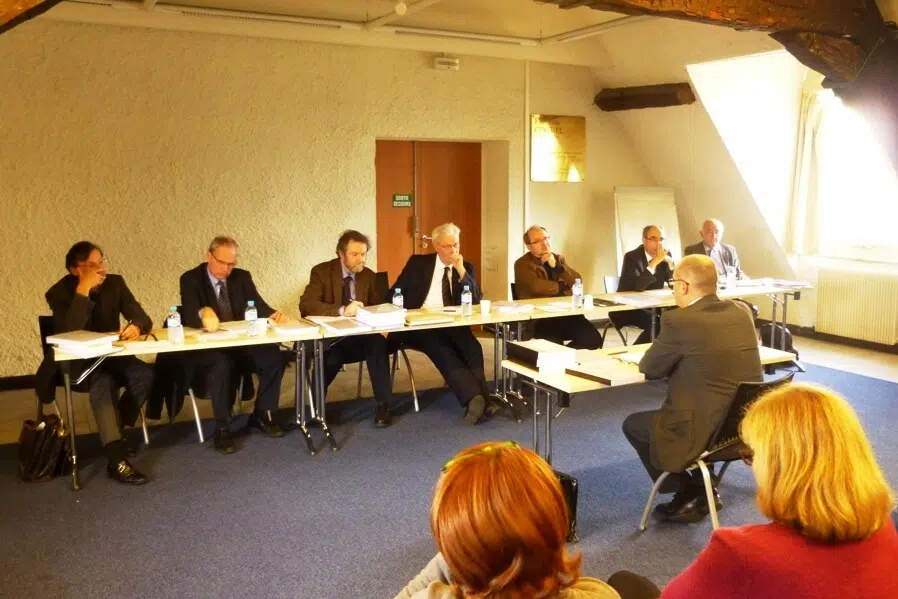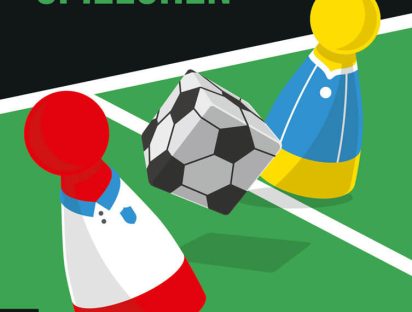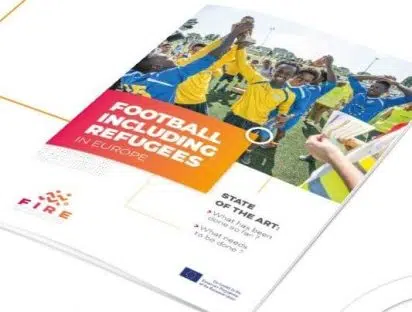Ever attended a French ‘Habilitation’ defence? It’s a wonderfully old-fashioned academic ritual, in which an already established scholar submits a kind of second original dissertation plus a retrospective account of his entire scholarly work and career to a jury of his peers in order to obtain the official authorisation to direct doctoral research. You may well wonder how other countries such as the US and the UK managed to produce dozens of Nobel Prizes without this procedure, but then again, each culture has its own rites of passage.
The habilitation defence I attended yesterday at Sciences Po in Paris was our friend Paul Dietschy’s. While there is no doubt that he’s the uncontested top French football historian and more knowledgeable on his object of study than any of the seven members of his habilitation jury (all of whom were male…), but still he underwent the ritual with humility and grace.

Paul in front of his jury.
Paul’s habilitation, which I sincerely hope to see published in book form among the numerous publications that the centenary of World War I will no doubt unleash in 2014, retraces the evolution of French sport between 1914 and 1920. As usual his work is rigorously based on a patient exploration of different types of archives, synthesizing and integrating where useful a large array of secondary sources.
Overall he was congratulated on the density and depth of his research, as well as on his writing, which was considered nuanced, coherent, dynamic – a pleasure to read even for the non-specialist (I confirm). He was also praised for having managed to resist the temptation of French navel-gazing and open up, whenever possible, to international collaboration of high quality (I confirm, too!).
He was criticised several times for writing mainly ‘history from above’ and for failing to complement his analysis with ‘history from below’, but that’s no doubt the price to pay for the rigour with which he focuses on reliable evidence only and refuses to give in to speculation about individual manners of experiencing sport in and behind the trenches. Unfortunately, in 1914-1918 there were no football chatrooms in which the conscripts would have exchanged about their emotions when enjoying a football match off duty. No amateur YouTube videos either.
What lesson do I take away from these four hours of respectful intellectual exchange, during which Paul defended – stoically and elegantly like Beckenbauer in the second half of the 1974 World Cup final – his work against the praise and concerns brought forward by each of the eminent jury members? Perhaps the assertion that ‘the history of sports needs to be written in a European perspective, because only in comparing and integrating different perspectives will you truly understand what happened in your own country and culture’. I couldn’t agree more.
One question however remained unanswered: how Paul found time and energy to write and prepare the huge dossier for this ‘Great Match’ while at the same time preparing, organising and hosting the FREE conference in Besançon remains a mystery to me. He must be at least as exhausted now as Beckenbauer after the 1970 World Cup semi-final in the Mexican heat. But more successful! Congratulations, Paul. Great Match.
[cite]




